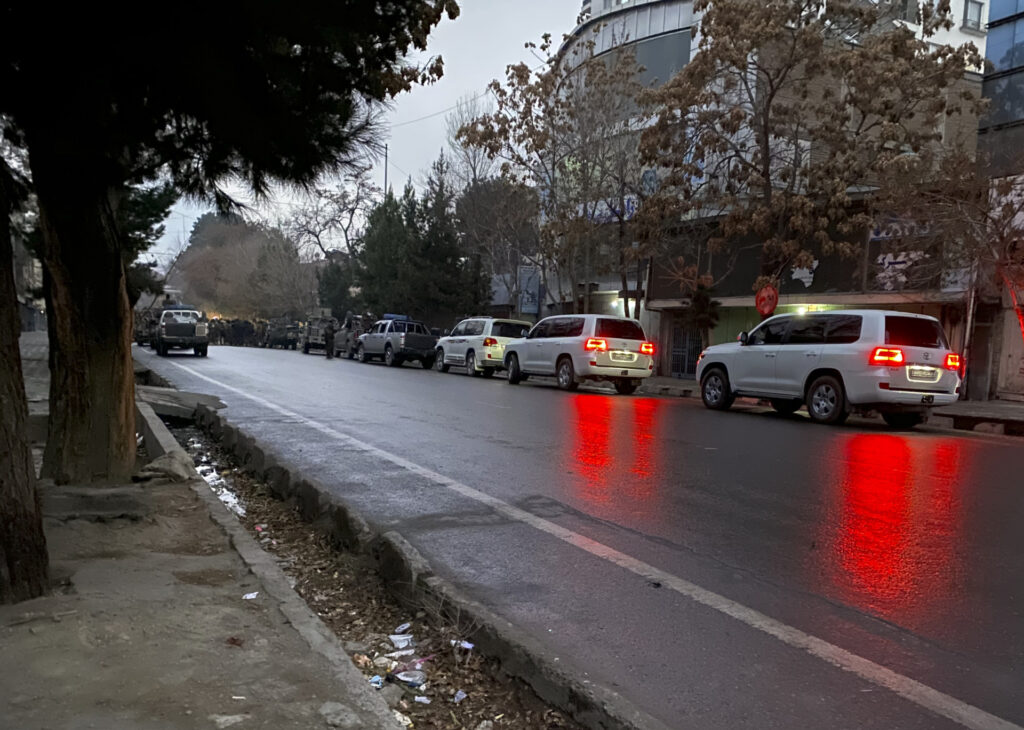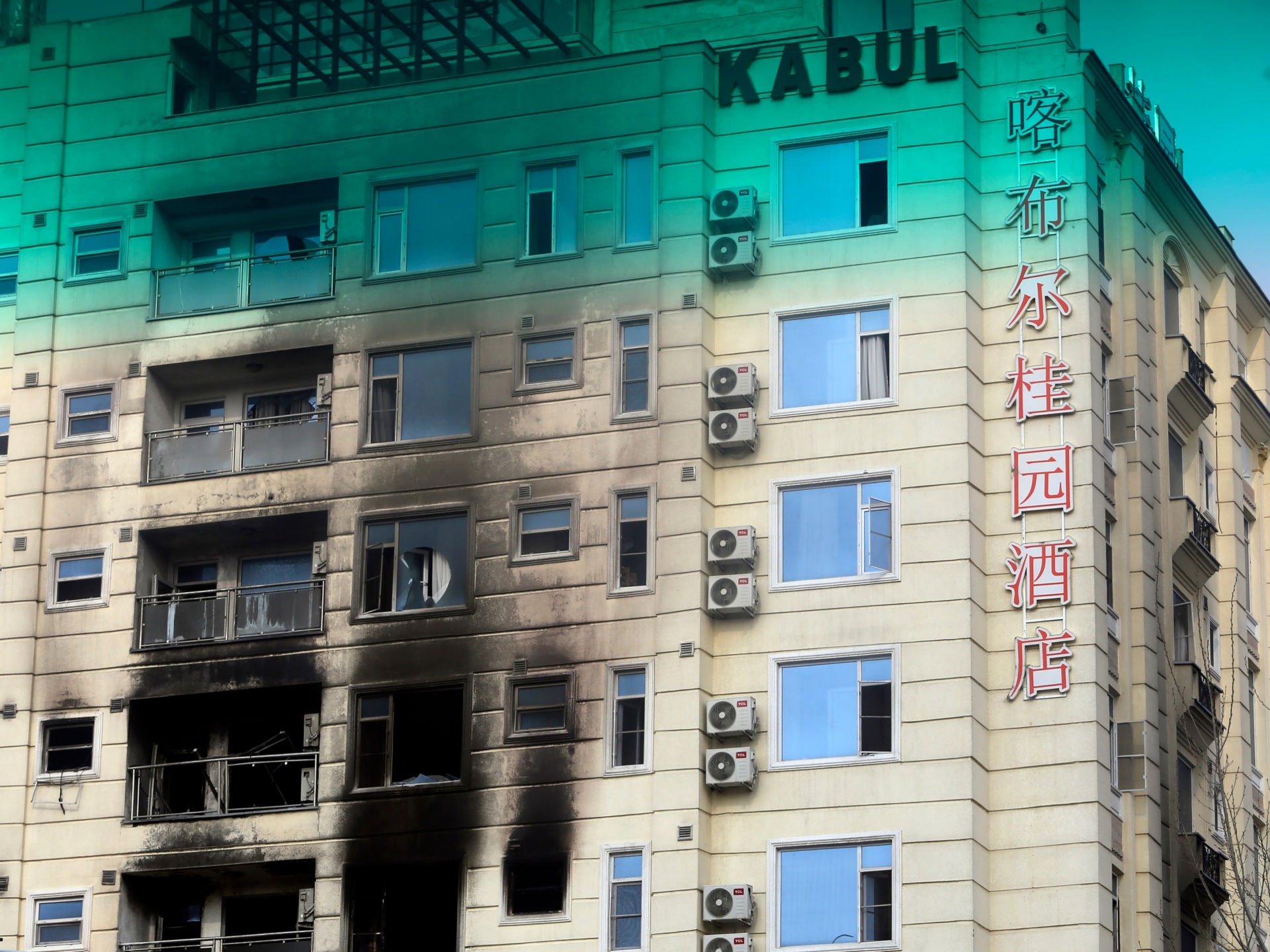Gunmen attacked a hotel in Kabul, Afghanistan, on Monday, causing at least three deaths and 21 injuries. Islamic State forces took credit for the assault, which targeted a guest house used by Chinese nationals working with the Taliban regime.
“At around 2:30, a hotel in Shar-e-naw area of Kabul city by the name of Kabul Hotel came under attack by some foreigners and local Afghans,” a Kabul police spokesman told CBS News on Monday.
Chief Taliban spokesman Zabiullah Mujahid said three gunmen were involved in the attack, and all three were killed in a firefight with security forces. The Islamic State franchise in Afghanistan, often referred to as ISIS-Khorasan or ISIS-K, claimed responsibility for the operation.
According to ISIS, two of its terrorists “attacked a big hotel frequented by Chinese diplomats and businessmen in Kabul, where they detonated two explosive devices hidden inside two bags.”

Taliban fighters inspect in the site of an attack in the city of Kabul, Afghanistan, Monday, Dec. 12, 2022. A Taliban official says that a hotel building has come under a complex attack in the Afghan capital Kabul. (AP Photo/Sidiqullah Khan)
Eyewitnesses reported hearing at least one explosion from inside the hotel, after which smoke poured from several of its windows. ISIS said one of the bombs targeted a party held by the hotel for its Chinese guests.
Mujahid claimed there were only two minor injuries to “foreigners” staying at the hotel, but a local emergency hospital run by an Italy-based humanitarian organization called EMERGENCY reported receiving a much larger number of injured people, three of whom were dead upon arrival. It was not immediately clear if those three fatalities were the attackers.
A reporter in Kabul posted a video of someone trying to climb out of the burning hotel, only to lose his grip and fall a considerable distance. It was not clear if this individual was a hotel guest or one of the terrorists:
As CBS noted, the building that came under attack has Chinese signage running down its side and some locals refer to it as the “Chinese hotel.” On Tuesday, Chinese Foreign Ministry spokesman Wang Wenbin said five Chinese nationals were wounded in the attack.
“This is an extremely outrageous terrorist attack, and we are deeply shocked by it. China firmly opposes all forms of terrorism and strongly condemns this attack. We express our condolences to members of the Afghan security forces who lost their lives in this attack and sympathies to the people who have been injured,” Wang said.
China’s state-run Global Times on Tuesday quoted an eyewitness to the attack, Shanghai International Studies University professor Wang Duanyong, who described an hour-long gun battle and over ten explosions spread across the seventh and eighth floors of the hotel.
ISIS, which would like to wrest control of Afghanistan from its extremist rivals in the Taliban, has conducted several terrorist attacks against representatives from the few countries openly allied with the Taliban regime, such as Pakistan, Russia, and especially China.
China is reluctant to disrupt the rest of its global diplomatic efforts by officially recognizing the Taliban junta, but Beijing is very eager to do business in Afghanistan and is especially keen to exploit Afghanistan’s mineral resources.
Smoke rises from a hotel building after an explosions and gunfire in the city of Kabul, Afghanistan, Monday, Dec. 12, 2022. A Taliban official says that a hotel building has come under a complex attack in the Afghan capital Kabul. (AP Photo)
The Chinese government is not satisfied with the level of security provided by the Taliban for Chinese agents and businessmen. Less than 24 hours before the Kabul hotel attack, Chinese Ambassador Wang Yu scolded the Taliban for not paying enough attention to the security of the Chinese embassy in Kabul.
The Chinese Foreign Ministry said on Tuesday its embassy in Kabul “immediately lodged a serious representation with the Afghan interim government,” a term China delicately employs to describe the Taliban junta that overthrew the legitimate government of Afghanistan in August 2021.
China demanded the Taliban “make every effort to search for and rescue Chinese nationals,” which would seem to contradict the Taliban’s claim that no foreigners were severely injured in the assault.
On Tuesday, the Chinese government urged its citizens to “evacuate from Afghanistan as soon as possible.” This would seem to be bad news for the Taliban regime, which has been heavily counting on Chinese support to jump-start Afghanistan’s moribund economy.
